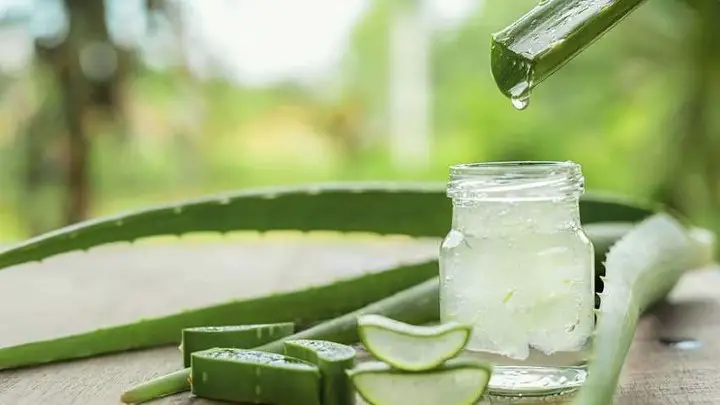When you think of aloe vera, are you intrigued by the plant’s medical uses?
Aloe vera, also known as the “houseplant of immortality”, is a plant native to the northern part of Africa. In ancient times, most parts of the world used aloe vera in treating different medical conditions, and they were successful in doing so.
But does it work? Is aloe vera good for your health? Today, we’re going to talk about what aloe vera is, its medical uses, side effects, and more. Keep reading to find out.
What Is Aloe Vera?
Aloe vera is a plant that has fleshy leaves, which hold a gel-like substance. You can apply this gel to your skin to treat sunburns, burns, cuts, and rashes.
You can also consume aloe vera gel for its health benefits — it’s rich in antioxidants and vitamins that promote good health and help protect against disease.
Today, aloe vera products are available from many sources, including drugstores, beauty supply stores, and online retailers.
Medical Uses of Aloe Vera
1. Promotes Oral Health
Aloe vera gel has antibacterial properties that help to fight plaque-causing bacteria in your mouth. It can also help reduce gum bleeding and inflammation by keeping your gums and teeth healthy and strong.
2. Diabetes Management
Aloe vera may help with blood glucose control in diabetes. According to a study published in 2001 by the National Center for Biotechnology Information, aloe vera can help to lower blood glucose levels in diabetic rats.
3. Improves Irritable Bowel Syndrome
Drinking one ounce of aloe vera juice a day may help improve symptoms of irritable bowel syndrome (IBS), such as stomach pain. It may also help with heartburn and inflammation of the stomach lining (gastritis).
SEE: Drinking Aloe Vera Benefits Your Body. Find Out How
4. Soothes Burns
Aloe vera gel is a commonly used topical medicine for first-degree burns. It can help soothe and moisturize skin, making it ideal to use on small surface burns. Aloe vera gel is also effective in treating second-degree burns, reducing inflammation, pain, and scarring.
5. Aids Wound Healing
Another well-known benefit of aloe vera is its ability to speed up the healing process of wounds. According to a 2015 report from “BioMed Research International”, aloe vera stimulates cell activity, which in turn increases collagen production on the wound site.
6. Strengthens Immune System
Aloe vera juice may benefit your immune system by promoting white blood cell production. It may also help prevent bacteria from sticking to the walls of your intestines and urinary tract. This can help prevent infections in your digestive and urinary tract systems.
7. Moisturizes Dry Skin
Aloe vera gel has been shown to effectively treat dry skin. The gel contains a variety of vitamins, minerals, and enzymes that help keep skin supple and smooth while removing dead cells from the surface of the skin.
SEE: Aloe Vera as Moisturizer: Benefits, Risks, and How to Apply Properly
8. Reduces Constipation
Aloe vera juice has been shown to relieve constipation in some people. This may be because it contains anthraquinones, compounds that have a laxative effect.
To use aloe vera for constipation, experts recommend taking one-half to one full teaspoon of aloe vera juice. However, you should not use this remedy for too long as it may cause diarrhea, abdominal cramps, and electrolyte imbalances.
9. Treats Ulcers
According to research, this plant is also beneficial in decreasing symptoms associated with mouth ulcers, such as pain and inflammation. But it’s unclear how effective this approach is when compared with other treatments such as pain relievers like ibuprofen (Advil).
10. Heals Sunburns
One of the most common medical uses of aloe vera is in the treatment of sunburns. The gel from this plant contains vitamins, enzymes, minerals, and amino acids that can help skin heal faster. It also contains anti-inflammatory compounds that reduce skin inflammation.
11. Treats Acne
Acne is a common skin condition that can have many different causes, including infections, excess oil production, or hormonal changes.
According to a 2014 study, applying aloe vera gel to acne lesions can reduce acne symptoms. In this study, there was a significant reduction in the number of acne lesions after just 30 days of aloe vera treatment.
SEE: Is Aloe Vera Good for Acne? See How It Works Here
Side Effects of Aloe Vera
While aloe vera has many medical uses, it also comes with some potential side effects.
Aloe vera can cause severe reactions in people who have a latex allergy. People who have an allergy to garlic, onions, or tulips may also react to aloe vera. If you notice any kind of rash or swelling after using aloe vera, discontinue use immediately and contact your doctor.
In addition, aloe vera can cause miscarriage in pregnant women. It is not recommended that pregnant women use aloe vera unless it is under the supervision of their doctor.
People who take laxatives regularly or have had ulcers should also talk to their doctors before using aloe vera. This natural product can cause side effects such as abdominal cramps and diarrhea when taken in large quantities.
Furthermore, it is important to know your blood sugar level and consult a doctor before using aloe vera, as it may lower blood glucose levels. It can also interfere with prescription drugs, especially diuretics, heart medications, and blood thinners.
How Can You Get Aloe Vera Gel?
The first is to grow your plant. If you grow your aloe vera plant, you can simply cut a leaf off the plant with a sharp knife.
Then, remove the skin by cutting down the edges of the leaf, before scooping out the gel inside. You can apply this gel directly to your skin or use it to make aloe vera juice and take it orally.
The other option is to buy a bottle of aloe vera gel at a health food store or online store. Purchase a small bottle, to begin with, and make sure it’s pure aloe vera gel with no added ingredients.
Some commercial aloe vera gels contain artificial ingredients, sugar, or other diluting agents that may affect the product’s natural properties.
SEE: Health Benefits of Aloe Vera That Makes It a Wonder Plant
Can You Drink Aloe Vera?
Yes, you can. The most common way of drinking aloe vera is to combine aloe vera gel with fruits to make an aloe vera juice. You can also purchase aloe vera juice at many health food stores and some grocery stores.
Depending on the brand and quality, the taste of commercial aloe vera juice can differ. Some brands do not contain any added sugar, while others do. Some brands also include citric acid or other flavors such as apple or cherry, so the taste can be more pleasant.
Another option is to add aloe vera gel to water. However, this should be done carefully, since aloe vera gel has a very distinctive flavor that may not appeal to everyone.
If you want to try adding aloe vera to water, it’s best to start with just a small amount and see how you like the flavor before adding more. Aloe water can help you stay hydrated and give your immune system a boost when you’re feeling under the weather.
The only downside is that excessive consumption of aloe vera can lead to diarrhea, cramping, and stomach pain. The amount of aloe vera juice or water recommended for an adult is 2 ounces (1/4 cup).
How Do You Make Aloe Vera Juice?
- Start by washing the aloe vera leaf to remove any dirt and bacteria.
- Use a sharp knife to make a smooth cut along either side of the spines.
- Then, make a second cut around a one-quarter inch from the top of the leaf and peel off the top strip of skin.
- Next, scrape off the gel from inside the leaf with a spoon.
- Place the gel in your blender and blend until it is smooth; add water as required to achieve your desired consistency.
- Pour into a glass and enjoy.
FAQs
What is aloe vera latex?
Aloe vera latex is the yellowish liquid inside the leaf of an aloe vera plant. You can take it orally as a laxative to treat constipation and other bowel problems.
However, due to safety concerns, experts recommend using aloe latex in small doses and under the supervision of a doctor.
Does aloe vera detoxify the body?
No, it doesn’t. Although aloe vera aids in digestion, which is important for detoxification, it does not contain any special detoxifying properties.
There’s no evidence that aloe vera can help rid the body of harmful substances, such as heavy metals or environmental chemicals.
Is aloe vera safe?
Yes, it is. Aloe vera is considered safe for men and women in recommended amounts. However, people who are allergic to latex, onions, garlic, or tulips may also be allergic to aloe vera.
You should also be cautious when using aloe vera orally, as it has a strong laxative effect that can lead to stomach problems.
What is the best way to drink aloe vera?
The best way to drink aloe vera is by adding it to cold beverages, smoothies, or even blended juice. Aloe vera is available in a gel form that you can easily add to any liquid of your choice.
Should you eat aloe vera raw?
No, you shouldn’t. Aloe vera contains latex — a bitter yellow sap that may cause side effects in some people. Depending on how much aloe vera latex you eat, you may experience mild side effects like irritations to severe reactions.
Conclusion
Aloe vera is a plant that has many medical uses and people have used it for centuries to heal wounds, treat acne, soothe burns, and more. When taken orally, it can also help with regulating bowel movements, constipation, and diarrhea.
You can purchase an aloe vera plant from a nursery and put it in your garden. Or, you could purchase the gel or juice from an aloe vera plant from a health food store.
However, as with any natural product, you should not use aloe vera without first consulting your doctor.
Thanks for reading.
Visit Africana Fashion for more articles on aloe vera and other natural products.







